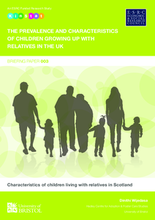This briefing paper series provides snapshots from the research titled ‘Kinship Care Re-visited: Using Census 2011 Microdata to Examine the Extent and Nature of Kinship Care in the UK’ funded by the Economic and Social Research Council (ESRC) grant ES/K008587/1. This work contains statistical data from the Office for National Statistics (ONS), which is Crown Copyright. The use of ONS statistical data in this work does not imply the endorsement of the ONS in relation to the interpretation or analysis of the statistical data. This work uses research datasets which may not exactly reproduce ONS aggregates.
INTRODUCTION
The background to this study, the aims and the method were described in Briefing Paper 1, published in the autumn of 2015. This briefing paper, which is the third in a series, provides a brief overview of the characteristics of the children growing up with relatives in Scotland. This series of briefing papers is published as part of a study funded by the ESRC to analyse secure microdata from the 2011 Census to provide nationally representative, reliable statistics and maps on the distribution and characteristics of kinship care households in the four countries of the UK. Individual and household secure microdata hold anonymised records of a third of the respondents in the 2011 Census. The secure data can only be accessed at secure settings by researchers with a special licence.
DEFINITIONS
Usually, kinship care is defined as when a child is brought by a relative or a friend. Children growing up in the care of friends could not be ascertained from the secure microdata. Therefore, children in kinship care in this study refers to children who are growing up in the care of relatives, such as grandparents, siblings, aunts, uncles and cousins. The UN Convention on the Rights of the Child defines anyone under the age of 18 years as a child unless majority is attained earlier. In the UK, the age of majority is 18 years. Therefore, in this study, a child was defined as anyone who is under the age of 18 (0-17 years).
CHILDREN IN KINSHIP CARE IN SCOTLAND
As the legal underpinnings, and the policy context differ between the UK countries, it is apt to start this paper by examining the legal and the policy context in Scotland. In Scotland, a child can be in kinship care in three situations. A description of each and the legal underpinning of those placements are given in Table 1. In 2007, the Scottish Government signed a concordat with the Convention of Scottish local authorities (COSLA) to provide equivalent support to that of stranger foster carers, to kinship carers bringing up children in State care. However, in terms of payments to kinship carers bringing up children in State care, there is still much variation between the 32 local councils, with most local councils frequently falling short in comparison with payments to foster carers looking after non-kin children.

